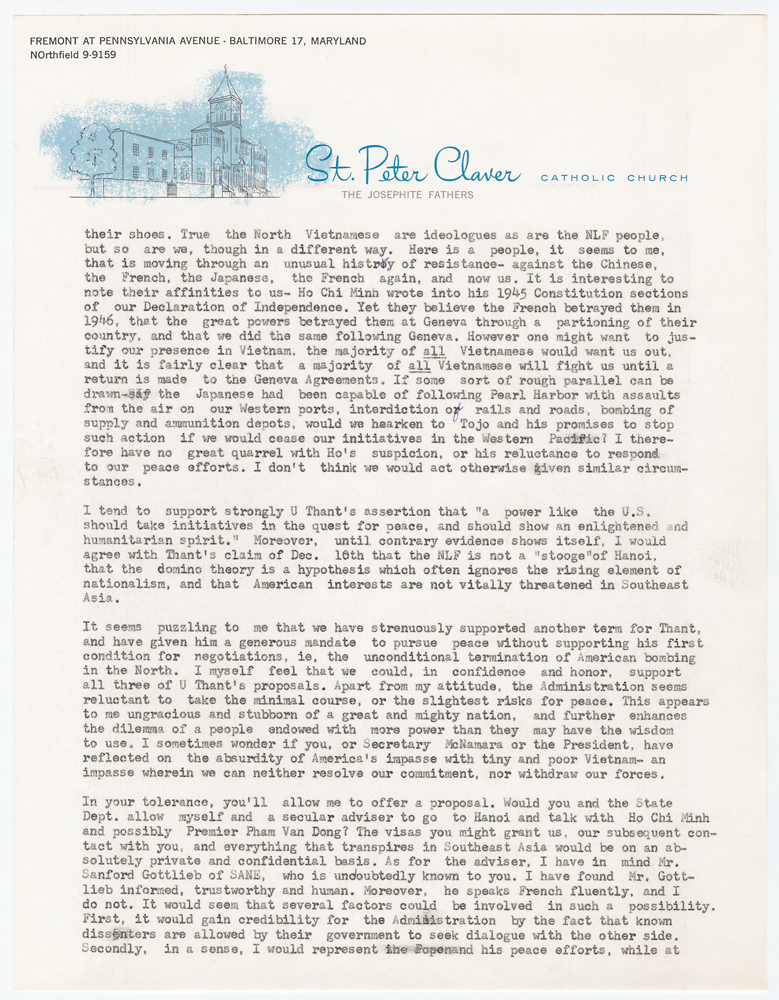 |
Letter from Philip Berrigan to Dean Rusk, January 11, 1967
 |
2 / 3 |
 |



| Collection: |
Cornell University Library |
| Date: |
1967-01-11 |
| Date of Digitization: |
2004 |
| Source: |
Daniel and Philip Berrigan Collection at the Division of Rare and Manuscript Collections, Cornell University Library |
| Original Dimensions: |
? |
| Creator: |
Berrigan, Philip, 1923-2002 |
|
|
Description:
In the letter to Secretary of State, Dean Rusk, Philip Berrigan discusses the political situation caused by the war in Vietnam, the wrongness and immorality of war. He urges Secretary Rusk to give peace a chance and offers his service as a possible emissary to meet Ho Chi Minh and start talks on ending the war.
Transcription: their shoes. True the North Vietnamese are ideologues as are the NLF people,
but so are we, though in a different way. Here is a people, it seems to me,
that is moving through an unusual history of resistance - against the Chinese,
the French, the Japanese, the French again, and now us. It is interesting to
note their affinities to us - Ho Chi Minh wrote into his 1945 Constitution sections
of our Declaration of Independence. Yet they believe the French betrayed them in
1946, that the great powers betrayed them at Geneva through a partioning of their
country, and that we did the same following Geneva. However one might want to jus-
tify our presence in Vietnam, the majority of all Vietnamese would want us out,
and it is" fairly clear that a majority of all Vietnamese will fight us until a
return is made to the Geneva Agreements, If some sort of rough parallel can be
drawn - say the Japanese had been capable of following Pearl Harbor with assaults
from the air on our Western ports, interdiction of rails and roads, bombing of
supply and ammunition depots, would we hearken to Tojo and his promises to stop
such action if we would cease our initiatives in the Western Pacific? I there-
fore have no great quarrel with Ho's suspicion, or his reluctance to respond
to our peace efforts. I don't think we would act otherwise given similar circum-
stances.
I tend to support strongly U Thant's assertion that "a power like the U.S.
should take initiatives in the quest for peace, and should show an enlightened and
humanitarian spirit." Moreover, until contrary evidence shows itself, I would
agree with Thant's claim of Dec. 10th that the NLF is not a "stooge" of Hanoi,
that the domino theory is a hypothesis which often ignores the rising element of
nationalism, and that American interests are not vitally threatened in Southeast
Asia.
It seems puzzling to me that we have strenuously supported another term for Thant,
and have given him a generous mandate to pursue peace without supporting his first
condition for negotiations, ie, the unconditional termination of American bombing
in the North. I myself feel that we could, in confidence and honor, support
all three of U Thant's proposals. Apart from my attitude, the Administration seems
reluctant to take the minimal course, or the slightest risks for peace. This appears
to me ungracious and stubborn of a great and mighty nation, and further enhances
the dilemma of a people endowed with more power than they may have the wisdom
to use, I sometimes wonder if you, or Secretary McNamara or the President, have
reflected on the absurdity of America's impasse with tiny and poor Vietnam - an
impasse wherein we can neither resolve our commitment, nor withdraw our forces.
In your tolerance, you'll allow me to offer a proposal. Would you and the State
Dept. allow myself and a secular adviser to go to Hanoi and talk with Ho Chi Minh
and possibly Premier Pham Van Dong? The visas you might grant us, our subsequent con-
tact with you. and everything that transpires in Southeast Asia would be on an ab-
solutely private and confidential basis. As for the adviser, I have in mind Mr.
Sanford Gottlieb of SANE, who is undoubtedly known to you. I have found Mr. Gott-
lieb informed, trustworthy and human. Moreover, he speaks French fluently, and I
do not. It would seem that several factors could be involved in such a possibility.
First, it would gain credibility for the Administration by the fact that known
dissenters are allowed by their government to seek dialogue with the other side.
Secondly, in a sense, I would represent the Pope and his peace efforts, while at
|




